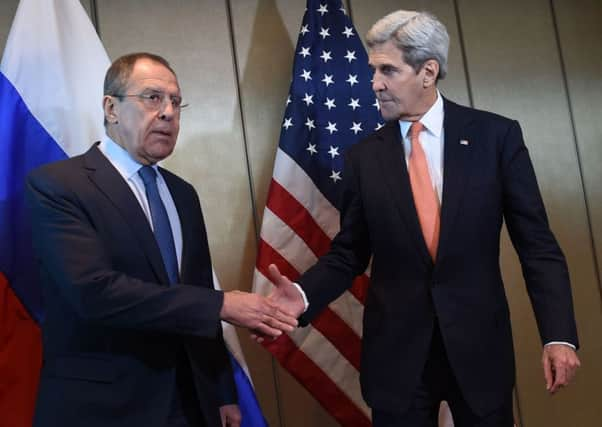Leaders: One small step but the journey is a long one


It is the seemingly intractable military conflict punctuated by a series of human tragedies which have forced the world to sit up and take notice.
The first of those tragedies was the death of three-year-old Aylan Kurdi, whose tiny body washed up on a Turkish beach last year and provided the defining image of a refugee crisis the likes of which has not been seen for decades.
Advertisement
Hide AdAdvertisement
Hide AdLast month, footage of starving children in the besieged town of Madaya – their rib cages showing through their malnourished frames – once again shamed the world.
And earlier this week figures from the Syrian Centre for Policy Research estimated that more than a tenth of the country’s population has been killed or injured since the civil war began in 2011.
Yesterday, diplomats agreed to work toward a “cessation of hostilities” within one week, albeit a temporary one which looks unlikely to hold.
The International Syria Support Group, which includes the UK, the United States, the Arab League, China and the United Nations, agreed that the nationwide ceasefire should apply to all groups involved in the conflict, with the exception of action taken against terrorist organisations such as Islamic State.
The agreement will also “accelerate and expand” deliveries of humanitarian aid, beginning this week.
Yet no sooner was the agreement finalised, than Syrian president Bashar al-Assad was reported as saying he intends to retake “the whole country” from rebel forces. Assad expressed support for peace talks but said negotiations did not mean “we stop fighting terrorism”.
The Syrian president has been emboldened by a Russian intervention which has bolstered his position and made a lasting peace seem even more remote.
The agreement signed yesterday, which was described by US Secretary of State John Kerry as “commitments on paper” only, seems purely aspirational at this stage.
Advertisement
Hide AdAdvertisement
Hide AdIn what has become a hellishly complex conflict, Russia is now the main power broker.
President Vladimir Putin has signed up to a temporary halt in hostilities, but he shows no sign of changing his allegiances away from Assad. Yet for there to be any hope of peace – or a least a breakthrough of any sort – Russia must stop its airstrikes.
Only then can there be a plan on the ground that all parties can sign up to.
In five years of conflict, more than a quarter of a million people have been killed.
Added to that, Europe is now dealing with the biggest refugee crisis it has faced since the Second World War.
And all the while the murderous death cult of Islamic State continues to carve out territory in Syria and neighbouring Iraq.
In a conflict so far punctuated only by stories of woe and suffering, a genuine pause is now needed by all sides.
Yesterday’s agreement was a move towards that, but it remains a tentative first step on a much longer journey.
Current law on smacking is right
Advertisement
Hide AdAdvertisement
Hide AdIn launching a strident attack on smacking, Scotland’s children’s minister has signalled a possible change in the way the practice is viewed in law.
Responding to a parliamentary question, Aileen Campbell said her government did not support the “physical punishment” of children or believe it to be effective. Her comments are likely to re-start the debate over whether smacking should be allowed.
Currently, the law allows for the “reasonable chastisement” of youngsters who misbehave.
The Scottish Government says it has no plans to change the law, but Ms Campbell is keen to learn from the experience of countries such as Sweden and Ireland, where bans have been introduced.
There is also growing pressure from children’s welfare organisations and academic experts to outlaw smacking. It follows a recent report entitled Equally Protected? which pointed to links between smacking youngsters and adult aggression.
The report also identified links to depressive symptoms and anxiety among children.
It is true that parents should have more in their armoury than a smack when disciplining their child.
Indeed, even as a last resort the efficacy of a smack is debatable.
Advertisement
Hide AdAdvertisement
Hide AdMs Campbell is right to have the debate, especially in light of the evidence from experts. But the introduction of laws to prohibit smacking would be a step to far.
Opposition parties are right to say such legislation would be “unneccessary and invasive”. The law as it stands works perfectly well, changing it for the sake of progress that is not actually progress would be a mistake.